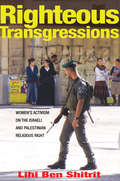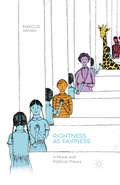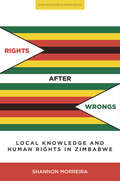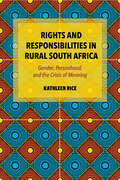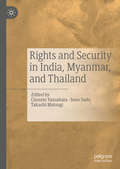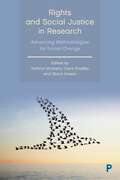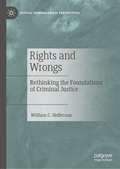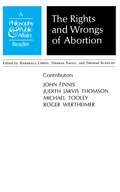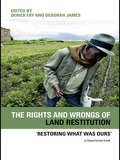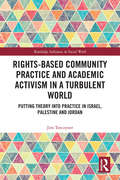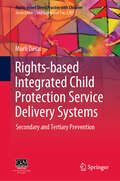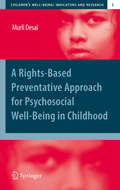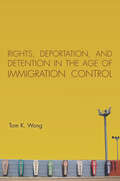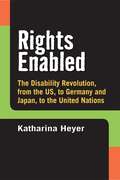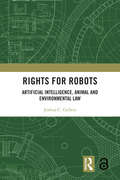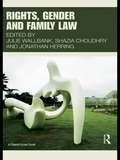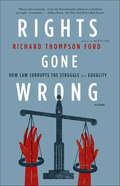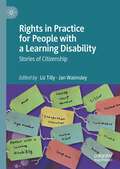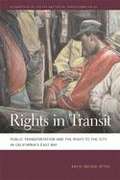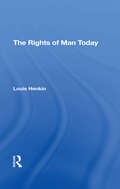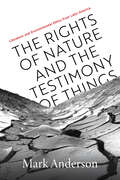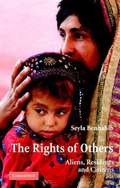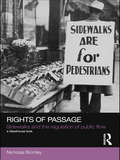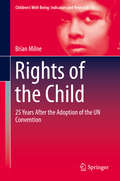- Table View
- List View
Righteous Transgressions
by Lihi Ben ShitritHow do women in conservative religious movements expand spaces for political activism in ways that go beyond their movements' strict ideas about male and female roles? How and why does this activism happen in some movements but not in others? Righteous Transgressions examines these questions by comparatively studying four groups: the Jewish settlers in the West Bank, the ultra-Orthodox Shas, the Islamic Movement in Israel, and the Palestinian Hamas. Lihi Ben Shitrit demonstrates that women's prioritization of a nationalist agenda over a proselytizing one shapes their activist involvement. Ben Shitrit shows how women construct "frames of exception" that temporarily suspend, rather than challenge, some of the limiting aspects of their movements' gender ideology. Viewing women as agents in such movements, she analyzes the ways in which activists use nationalism to astutely reframe gender role transgressions from inappropriate to righteous. The author engages the literature on women's agency in Muslim and Jewish religious contexts, and sheds light on the centrality of women's activism to the promotion of the spiritual, social, cultural, and political agendas of both the Israeli and Palestinian religious right. Looking at the four most influential political movements of the Israeli and Palestinian religious right, Righteous Transgressions reveals how the bounds of gender expectations can be crossed for the political good.
Rightness as Fairness: A Moral and Political Theory
by Marcus ArvanRightness as Fairness provides a uniquely fruitful method of 'principled fair negotiation' for resolving applied moral and political issues that requires merging principled debate with real-world negotiation.
Rights After Wrongs: Local Knowledge and Human Rights in Zimbabwe
by Shannon MorreiraThe international legal framework of human rights presents itself as universal. But rights do not exist as a mere framework; they are enacted, practiced, and debated in local contexts. Rights After Wrongs ethnographically explores the chasm between the ideals and the practice of human rights. Specifically, it shows where the sweeping colonial logics of Western law meets the lived experiences, accumulated histories, and humanitarian debts present in post-colonial Zimbabwe. Through a comprehensive survey of human rights scholarship, Shannon Morreira explores the ways in which the global framework of human rights is locally interpreted, constituted, and contested in Harare, Zimbabwe, and Musina and Cape Town, South Africa. Presenting the stories of those who lived through the violent struggles of the past decades, Morreira shows how supposedly universal ideals become localized in the context of post-colonial Southern Africa. Rights After Wrongs uncovers the disconnect between the ways human rights appear on paper and the ways in which it is possible for people to use and understand them in everyday life.
Rights and Responsibilities in Rural South Africa: Gender, Personhood, and the Crisis of Meaning
by Kathleen RiceRights and Responsibilities in Rural South Africa examines the gendered and generational conflicts surrounding social change in South Africa's rural Eastern Cape roughly twenty years after the end of Apartheid.In post-Apartheid South Africa, rights-based public discourse and state practices promote liberal, autonomous, and egalitarian notions of personhood, yet widespread unemployment and poverty demand that people rely closely on one another and forge relationships that disrupt the gendered and generational hierarchies framed as traditional and culturally authentic. Kathleen Rice examines the ways these tensions and restructurings lead to uncertainties about how South Africans should live together in their daily lives, with particular implications for understanding and responding to widespread gendered and sexual conflict and violence. Focusing particularly on the women of the village of Mhlambini, Rights and Responsibilities in Rural South Africa offers compelling portraits of how they experience and navigate widespread social and economic change and presents their experiences as a way of understanding how people navigate the moral ambiguities of contemporary South African life.
Rights and Security in India, Myanmar, and Thailand
by Sueo Sudo Chosein Yamahata Takashi MatsugiThis book is centred on the role of the triangular interactions among communities, educational sectors, and academic diplomacy in facilitating peaceful societal change by evaluating the common challenges in India, Myanmar, and Thailand. It analyses urban poverty, religious freedom, ethnic diversity, women’s rights, development and regional partnership, civil-military relations, and human security in democratic transition and explores in-depth the societal issues from local and international perspectives paying special attention to the protection of ‘rights’ and promotion of ‘security’ in these societies.The book highlights that the continuous application of knowledge across borders and the promotion of international norms are essential tools in enabling social transformations from the bottom. In addition, the contributors promote further discussion on both the process and the outcome from action research projects that shape the lives of the local people and their communities. The book therefore contributes to the existing literature by offering additional insights into the societies of India, Myanmar and Thailand for policy makers, social innovators, researchers, development analysts and planners and the general public including students.
Rights and Social Justice in Research: Advancing Methodologies for Social Change
by Kathryn McGarry, Ciara Bradley and Gloria KirwanCan our research create conditions for people to flourish? What kinds of questions do we ask about the social world and how knowledge is produced? Does our approach to research itself matter? This edited collection explores and illustrates the nature of research for social justice. Drawing on a diverse range of social research projects, it examines research with and for young people, marginalised communities and those who work to further social justice and human rights goals. Providing key examples of the tools, processes and outcomes of research relevant to social justice, including where and how these frameworks can be used in the design and execution of research, this is a much-needed intervention to social research methodology.
Rights and Wrongs: Rethinking the Foundations of Criminal Justice (Critical Criminological Perspectives)
by William C. HeffernanThis book seeks to explain why the concept of justice is critical to the study of criminal justice. Heffernan makes such a case by treating state-sponsored punishment as the defining feature of criminal justice. In particular, this work accounts for the state’s role as a surrogate for victims of wrongdoing, and so makes it possible to integrate victimology scholarship into its justice-based framework. In arguing that punishment may be imposed only for wrongdoing, the book proposes a criterion for repudiating the legal paternalism that informs drug-possession laws. Rethinking the Foundations of Criminal Justice outlines steps for taming the state’s power to punish offenders; in particular, it draws on restorative justice research to outline possibilities for a penology that emphasizes offenders’ humanity. Through its examination of equality issues, the book integrates recent work on the social justice/criminal justice connection into the scholarly literature on punishment, and so will particularly appeal to those interested in criminal justice theory.
Rights and Wrongs of Abortion: A Philosophy and Public Affairs Reader (Philosophy and Public Affairs Readers #1)
by Marshall Cohen, Thomas Nagel & Thomas ScanlonDuring its first two years of publication, Philosophy & Public Affairs contributed to the public debate on abortion a set of remarkable and brilliant articles which examine the basic philosophical issues posed by this controversial subject: whether the fetus is a person, whether it has a right to life, whether a woman has a right to decide what happens in and to her body, whether there is an ethical connection between abortion and infanticide, whether there is any point after conception where it is possible to draw the line beyond which killing is impermissible. These five essays, together here for the first time in a single volume, offer radically differing points of view; they provide the best sustained discussion of these philosophical issues available anywhere.Contents: Judith Jarvis Thomson, "A Defense of Abortion"; Roger Wertheimer, "Understanding the Abortion Argument"; Michael Tooley, "Abortion and Infanticide"; John Finnis, "The Rights and Wrongs of Abortion"; and Judith Jarvis Thomson, "Rights and Deaths."
The Rights and Wrongs of Land Restitution: 'Restoring What Was Ours'
by Derick Fay Deborah JamesThe Rights and Wrongs of Land Restitution: ‘Restoring What Was Ours’ offers a critical, comparative ethnographic, examination of land restitution programs. Drawing on memories and histories of past dispossession, governments, NGOs, informal movements and individual claimants worldwide have attempted to restore and reclaim rights in land. Land restitution programs link the past and the present, and may allow former landholders to reclaim lands which provided the basis of earlier identities and livelihoods. Restitution also has a moral weight that holds broad appeal; it is represented as righting injustice and healing the injuries of colonialism. Restitution may have unofficial purposes, like establishing the legitimacy of a new regime, quelling popular discontent, or attracting donor funds. It may produce unintended consequences, transforming notions of property and ownership, entrenching local bureaucracies, or replicating segregated patterns of land use. It may also constitute new relations between states and their subjects. Land-claiming communities may make new claims on the state, but they may also find the state making unexpected claims on their land and livelihoods. Restitution may be a route to citizenship, but it may engender new or neo-traditional forms of subjection. This volume explores these possibilities and pitfalls by examining cases from the Americas, Eastern Europe, Australia and South Africa. Addressing the practical and theoretical questions that arise, The Rights and Wrongs of Land Restitution thereby offers a critical rethinking of the links between land restitution and property, social transition, injustice, citizenship, the state and the market.
Rights-Based Community Practice and Academic Activism in a Turbulent World: Putting Theory into Practice in Israel, Palestine and Jordan (Routledge Advances in Social Work)
by Jim TorczynerDrawing on a theoretical model of coexistence premised on universality, reciprocity and inclusion, this book focusses on the development of academic social work programs and cross-border partnerships to promote social justice and peace in Israel, Palestine, and Jordan. Using the model of rights-based practice initiated by Professor Torczyner in Montreal and brought to the Middle East in the 1990s, it shows how the creation and brokering of cross-border partnerships added the concept of rights-based practice to the lexicon of these countries, established groundbreaking advocacy centers in the hearts of disadvantaged communities, developed academic social work programs, and initiated important policy changes in each country to reduce inequality and promote social inclusion. Showing how this evolving method of rights-based practice rooted in theories of coexistence was uniquely adapted in different contexts and cultures while negotiating complex, volatile political environments, it illustrates how long-term peace can be advanced when like-minded people —irrespective of nationality or religion—find ways to promote common interest and a regional culture where all people share the same rights. This book will be of interest to all social work students and practitioners interested in community organization and rights-based practice, as well as scholars, policy makers and practitioners of international development, political science, peace studies, Jewish studies, Middle Eastern studies, reconciliation, and conflict resolution.
Rights-based Integrated Child Protection Service Delivery Systems: Secondary and Tertiary Prevention (Rights-based Direct Practice with Children)
by Murli DesaiThe Sourcebook-IV provides training modules for rights-based integrated child protection service delivery systems at the secondary and tertiary prevention levels. Part 1 of the Sourcebook focuses on the preventative, comprehensive, integrated and systemic, and universal community-based and family-based service delivery systems for children; and the methods of case management and outcomes-based project cycle. Part 2 discusses children and families at risk and the role of community-based Integrated Childcare and Support Centres for providing supplementary care and support services to them at the secondary prevention level. It also focuses on children facing sociolegal problems such as deprivation of parental care, violence, and conflict with law, and the role of District-based Integrated Child Protection Centres for providing protection, justice and rehabilitation to them at the tertiary prevention level. Part 3 focuses on children in emergencies in general and in specific situations and role of Integrated Child Protection Centres in these situations. This is a necessary read for social workers, lawyers, researchers, trainers and teachers working on child rights across the world, and especially in developing countries.
A Rights-Based Preventative Approach for Psychosocial Well-being in Childhood (Children’s Well-Being: Indicators and Research #3)
by Murli DesaiChildren are one of the most important phase of human development and the most important target group for social work intervention. Most of the schools of human development and social work round the world have an elective course on children and some offer a concentration in this area. There are plenty of textbooks on intervention with children published by Western authors, focusing on useful theories and skills but mainly at the remedial level. They neither use the preventative approach nor the child rights perspective, which has been found useful in the developing nations. The books on child rights are generally published by the United Nations Children's Fund (UNICEF) and other international organisations working in the field of children such as Save the Children. These books focus on the useful child rights perspective but they neither integrate theories nor use the preventative approach. The proposed book A Rights-based Preventative Approach for Children's Psychosocial Well-Being: will be the first to apply the child rights perspective and the preventative approach to intervention for children's psychosocial well-being. It is an integration of theories with practice and teaching relevant in different parts of the world. The book is divided into the following three parts: Part 1: Introduction to a Rights-based Preventative Approach for Children's Psychosocial Well-Being.- Part 2: Primary Prevention for Children's Psychosocial Well-Being.- Part 3: Secondary and Tertiary Prevention for Children's Psychosocial Well-Being
Rights, Deportation, and Detention in the Age of Immigration Control
by Tom K. WongImmigration is among the most prominent, enduring, and contentious features of our globalized world. Yet, there is little systematic, cross-national research on why countries "do what they do" when it comes to their immigration policies. Rights, Deportation, and Detention in the Age of Immigration Control addresses this gap by examining what are arguably the most contested and dynamic immigration policies--immigration control--across 25 immigrant-receiving countries, including the U. S. and most of the European Union. The book addresses head on three of the most salient aspects of immigration control: the denial of rights to non-citizens, their physical removal and exclusion from the polity through deportation, and their deprivation of liberty and freedom of movement in immigration detention. In addition to answering the question of why states do what they do, the book describes contemporary trends in what Tom K. Wong refers to as the machinery of immigration control, analyzes the determinants of these trends using a combination of quantitative analysis and fieldwork, and explores whether efforts to deter unwanted immigration are actually working.
Rights Enabled: The Disability Revolution, From The Us, To Germany And Japan, To The United Nations
by Katharina C. HeyerDrawing on extensive fieldwork and a variety of original sources, Katharina Heyer examines three case studies--Germany, Japan, and the United Nations--to trace the evolution of a disability rights model from its origins in the U. S. through its adaptations in other democracies to its current formulation in international law. She demonstrates that, although notions of disability, equality, and rights are reinterpreted and contested within various political contexts, ultimately the result may be a more robust and substantive understanding of equality. Rights Enabled is a truly interdisciplinary work, combining sociolegal literature on rights and legal mobilization with a deep cultural and sociopolitical analysis of the concept of disability developed in Disability Studies. Heyer raises important issues for scholarship on comparative rights, the global reach of social movements, and the uses and limitations of rights-based activism.
Rights for Robots: Artificial Intelligence, Animal and Environmental Law
by Joshua C. GellersBringing a unique perspective to the burgeoning ethical and legal issues surrounding the presence of artificial intelligence in our daily lives, the book uses theory and practice on animal rights and the rights of nature to assess the status of robots. Through extensive philosophical and legal analyses, the book explores how rights can be applied to nonhuman entities. This task is completed by developing a framework useful for determining the kinds of personhood for which a nonhuman entity might be eligible, and a critical environmental ethic that extends moral and legal consideration to nonhumans. The framework and ethic are then applied to two hypothetical situations involving real-world technology—animal-like robot companions and humanoid sex robots. Additionally, the book approaches the subject from multiple perspectives, providing a comparative study of legal cases on animal rights and the rights of nature from around the world and insights from structured interviews with leading experts in the field of robotics. Ending with a call to rethink the concept of rights in the Anthropocene, suggestions for further research are made. An essential read for scholars and students interested in robot, animal and environmental law, as well as those interested in technology more generally, the book is a ground-breaking study of an increasingly relevant topic, as robots become ubiquitous in modern society.
Rights, Gender and Family Law
by Julie Wallbank Shazia Choudhry Jonathan HerringThere has been a widespread resurgence of rights talk in social and legal discourses pertaining to the regulation of family life, as well as an increase in the use of rights in family law cases, in the UK, the US, Canada and Australia. Rights, Gender and Family Law addresses the implications of these developments – and, in particular, the impact of rights-based approaches upon the idea of welfare and its practical application. There are now many areas of family law in which rights and welfare based approaches have been forced together. But whilst, to many, they are premised upon different ethics – respectively, of justice and of care – for others, they can nevertheless be reconciled. In this respect, a central concern is the 'gender-blind' character of rights-based approaches, and the ontological and practical consequences of their employment in the gendered context of the family. Rights, Gender and Family Law explores the tensions between rights-based and welfare-based approaches: explaining their differences and connections; considering whether, if at all, they are reconcilable; and addressing the extent to which they can advantage or disadvantage the interests of women, children and men. It may be that rights-based discourses will dominate family law, at least in the way that social policy and legislation respond to calls of equality of rights between mothers and fathers. This collection, however, argues that rights cannot be given centre-stage without thinking through the ramifications for gendered power-relations, and the welfare of children. It will be of interest to researchers and scholars working in the fields of family law, gender studies and social welfare.
Rights Gone Wrong: How Law Corrupts the Struggle for Equality
by Richard Thompson FordA New York Times Notable Book for 2011 Since the 1960s, ideas developed during the civil rights movement have been astonishingly successful in fighting overt discrimination and prejudice. But how successful are they at combating the whole spectrum of social injustice-including conditions that aren't directly caused by bigotry? How do they stand up to segregation, for instance-a legacy of racism, but not the direct result of ongoing discrimination? It's tempting to believe that civil rights litigation can combat these social ills as efficiently as it has fought blatant discrimination. In Rights Gone Wrong, Richard Thompson Ford, author of the New York Times Notable Book The Race Card, argues that this is seldom the case. Civil rights do too much and not enough: opportunists use them to get a competitive edge in schools and job markets, while special-interest groups use them to demand special privileges. Extremists on both the left and the right have hijacked civil rights for personal advantage. Worst of all, their theatrics have drawn attention away from more serious social injustices. Ford, a professor of law at Stanford University, shows us the many ways in which civil rights can go terribly wrong. He examines newsworthy lawsuits with shrewdness and humor, proving that the distinction between civil rights and personal entitlements is often anything but clear. Finally, he reveals how many of today's social injustices actually can't be remedied by civil rights law, and demands more creative and nuanced solutions. In order to live up to the legacy of the civil rights movement, we must renew our commitment to civil rights, and move beyond them.
Rights in Practice for People with a Learning Disability: Stories of Citizenship
by Liz Tilly Jan WalmsleyThis book aims to raise awareness about the possibility of achieving the goals of the United Nations Convention on the Rights of Persons with Disabilities (UNCRPD), in order for all disabled people to enjoy the benefit of human rights. The stories of people who have been supported to enjoy their rights and their citizenship will enable readers to focus on how services and support can enable people with a learning disability to have their rights upheld, with an outcome of citizenship, independence and achievement. Despite the UNCRDP being in place since 2006, a significant number of learning disability service provider organisations and professionals in the UK are not aware of its existence. This book aims to bridge the gap between policy and practice to demonstrate the value of a human rights approach as the foundation for services and support for people with a learning disability.
Rights In Transit: Public Transportation And The Right To The City In California's East Bay
by Kafui Ablode Attoh Mathew Coleman Sapana DoshiIs public transportation a right? Should it be? For those reliant on public transit, the answer is invariably "yes" to both. Indeed, when city officials propose slashing service or raising fares, it is these riders who are often the first to appear at that officials' door demanding their "right" to more service. Rights in Transit starts from the presumption that such riders are justified. For those who lack other means of mobility, transit is a lifeline. It offers access to many of the entitlements we take as essential: food, employment, and democratic public life itself. While accepting transit as a right, this book also suggests that there remains a desperate need to think critically, both about what is meant by a right and about the types of rights at issue when public transportation is threatened. Drawing on a detailed case study of the various struggles that have come to define public transportation in California's East Bay, Rights in Transit offers a direct challenge to contemporary scholarship on transportation equity. Rather than focusing on civil rights alone, Rights in Transit argues for engaging the more radical notion of the right to the city.
The Rights Of Man Today
by Louis HenkinThis book analyzes the evolution of the idea of human rights, the "universalization" of human rights as reflected in the spread of "constitutionalism" to almost all states. It focuses on the conditions that must exist if the rights of men and women are to be more secure in the future.
The Rights of Nature and the Testimony of Things: Literature and Environmental Ethics from Latin America
by Mark AndersonThe Rights of Nature and the Testimony of Things begins by analyzing the ethical debates and political contexts relating to Latin American &“rights of nature&” legislation and the political ontology of nonhuman speech within a framework of intercultural and multispecies diplomacy. Author Mark Anderson shows how Latin American authors and thinkers complicate traditional humanistic perspectives on nature, the social, and politics, exploring how animals, plants, and environments as a whole might be said to engage in social relations and political speech or self-representation. Drawing Native Amazonian thought into productive tension with a variety of posthumanist theoretical frameworks—ranging from Derrida&’s conceptualization of passive decision and hospitality to biosemiotics, Karen Barad&’s theorization of intra-activity, and Isabelle Stengers&’ proposal for cosmopolitical diplomacy—Anderson analyzes literary works by Julio Cortázar, Clarice Lispector, José Eustasio Rivera, and Davi Kopenawa that reframe environmental ethics in terms of collective, multispecies work and reciprocal care and politics as a cosmopolitics of friendship rooted in diplomacy across difference. Finally, Anderson examines the points of connection and divergences between Latin American relational ontologies and Euro American posthumanist theories within Indigenous Latin American remodernization projects that reappropriate and repurpose ancestral practices as well as develop new technologies with the goal of forging alternative modernities compatible with a livable future for all species.
The Rights of Others: Aliens, Residents, and Citizens
by Seyla BenhabibThis book explores the tension between universal principles of human rights and the self-determination claims of sovereign states as they affect the claims of refugees, asylum-seekers and immigrants. Drawing on the work of Kant's "cosmopolitan doctrine" and positions developed by Hannah Arendt, Seyla Benhabib explores how the topic has been analyzed within the larger history of political thought. She argues that many of the issues raised in abstract debate between universalism and multiculturalism can find acceptable solutions in practice.
The Rights of Others: Aliens, Residents and Citizens
by Seyla BenhabibThis book explores the tension between universal principles of human rights and the self-determination claims of sovereign states as they affect the claims of refugees, asylum-seekers and immigrants. Drawing on the work of Kant's "cosmopolitan doctrine" and positions developed by Hannah Arendt, Seyla Benhabib explores how the topic has been analyzed within the larger history of political thought. She argues that many of the issues raised in abstract debate between universalism and multiculturalism can find acceptable solutions in practice.
Rights of Passage: Sidewalks and the Regulation of Public Flow (Social Justice)
by Nicholas BlomleyRights of Passage: Sidewalks and the Regulation of Public Flow documents a powerful and under-researched form of urban governance that focuses on pedestrian flow. This logic, which Nicholas Blomley terms 'pedestrianism', values public space not in terms of its aesthetic merits, or its success in promoting public citizenship and democracy. Rather, the function of the sidewalk is understood to be the promotion and facilitation of pedestrian flow and circulation, predicated on the appropriate arrangement of people and objects. This remarkably pervasive yet overlooked logic shapes the ways in which public space is regulated, conceived of, and argued about. Rights of Passage shows how the sidewalk is literally produced, encoded, rendered legible and operational with reference to a dense array of codes, diagrams, specifications, academic and professional networks, engineering rubrics, regulation and case law – all in the name of unfettered circulation. Although a powerful form of governance, pedestrianism tends to be obscured by grander and more visible forms of urban regulation. The rationality at work here may appear commonplace; but, precisely because it is uncontroversial, pedestrianism is able to operate below the academic and political radar. Complicating the prevailing tendency to focus on the socially directive nature of public space regulation, Blomley reveals the particular ways in which pedestrianism deactivates rights-based claims to public space.
Rights of the Child
by Brian MilneThis work reviews the progress of children's rights 25 years since the adoption of the UN Convention on the Rights of the Child. It studies the progress of that human rights instrument as part of an ongoing process. It examines how recent past, present and future generations will benefit or suffer as part of the process in which outcomes cannot be predicted. It does not project into the future. Its emphasis is on a review of the period after 1989 and it comments on what has happened and offering guidance on how children's rights might progress. The book presents a realistic but not always critical review of two and a half decades of intensive activity in the field of children's rights worldwide. It includes both failures and examples of good practice and positive experiences. It offers a review of progress and lack of progress in child rights and welfare in the twelve countries used as case studies in its predecessor, The Next Generation. Finally, the volume considers the impact of current geopolitical and economic realities on children's rights in the early years of the twenty-first century. The book is a tribute to Judith Ennew and pays homage to all of the people who have contributed so much to children's rights over the years and wishes to encourage others to take up the cause.
